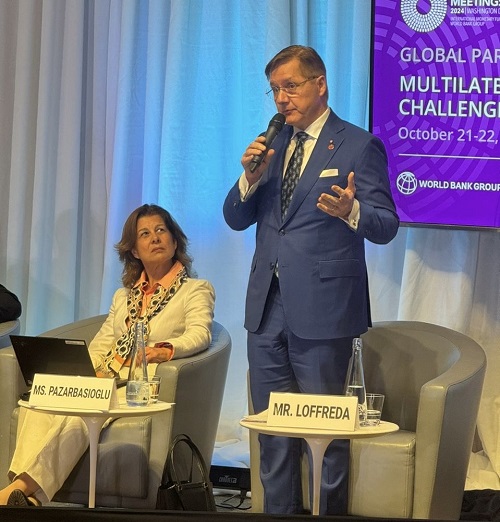Report from the Chair of the Canadian Chapter of the Parliamentary Network on the World Bank and IMF
Senator Loffreda travelled to Washington last week to participate, as Chair of the Canadian chapter of the Parliamentary Network on the World Bank and the International Monetary Fund, in the 2024 Global Parliamentary Forum. He wrote about his experience in this column.
Canada is one of the most advanced economies in the world. Despite the challenges we have domestically, Canada still has the financial capacity, and some might say the responsibility or obligation, to help the poorest nations around the world escape poverty and raise the standard of living of some of the most marginalized and vulnerable populations.
Too often, we take for granted the fact that our children can go to school, that we have reliable and affordable energy, and access to a public healthcare system. Millions of citizens around the world are not so lucky. This is where the World Bank Group (WBG) and the International Monetary Fund (IMF) can step in and affect lasting change for real people in dire situations.
The World Bank’s mission is to eliminate extreme poverty and boost shared prosperity through inclusive, sustainable economic growth and development. Fortunately, Canada, who was a founding member of the group in 1944, has a permanent seat on its Board of Executive Directors, an important position that allows us to be at the forefront of global development assistance efforts.
Through our international aid initiatives and investments, Canada is given an opportunity to advance our interests, priorities, and values abroad, by contributing to building a fairer, safer, and more sustainable planet. Canadians are generous people with their hearts on their sleeves and I know we believe in helping others live a better life.
But while the WBG and the IMF continue to do tremendous work in delivering international assistance and in supporting global economic stability, reforms are needed in its operations and programming to achieve greater results and to ensure the resilience of the global economy. As the need to eradicate poverty persists and emerging risks and geopolitical tensions continue to surface, this must be a priority for the more than 180 member states of the WBG and IMF.
Considering the massive sums of money that are injected in various programs and projects in these two institutions, we have an obligation to find ways of doing better in meeting the challenges of the 21st century.
That is the message I conveyed when I attended the Global Parliamentary Forum in Washington earlier this month, hosted by the Parliamentary Network for the World Bank and the IMF. As Chair of the Canadian Chapter of the Network, I had the honour of participating in a panel discussion celebrating the 80th anniversary of the 1944 Bretton Woods Conference that resulted in the founding of both institutions.
During my remarks, I reiterated Canada’s support – financial and otherwise – to these multilateral institutions, and our commitment to providing financing to lower income countries through various loans and grants.
According to the federal government’s latest report to Parliament on our international assistance program, Canada provided $15.5 billion in 2022-23 to help save lives and alleviate suffering in communities worldwide by promoting gender equality, reducing poverty, and building and promoting peace and security. One such investment was a $2.4 billion contribution to the IMF’s recently created Resilience and Sustainability Trust.
As I argued, it is imperative that the WBG and the IMF be increasingly more adaptable and flexible in how they assist countries in addressing poverty. It can do so by embracing innovative new financial instruments such as hybrid capital and portfolio guarantees.
While some may question the value of our international aid commitments, I would argue that Canada must remain a key player in these institutions.
Last month, at a speaking engagement at the Canada-U.K. Chamber of Commerce, the Governor of the Bank of Canada also stressed the importance of multilateral institutions like the WBG and the IMF. As Governor Macklem said, “effective and legitimate multilateral institutions don’t just happen. They need good governance, adequate resources, talent, and inspired management.”
I know Canada will continue to answer the call and be a strong voice at the table, but we also recognize that times are changing. In 2024 alone, the World Bank has already loaned more than $65 billion to help lower income and vulnerable economies. We need to make sure every dollar is wisely invested and has the greatest impact. Multilateral institutions need to be agile and resilient as global economic circumstances evolve.
As such, renewal and adaptation are two key features that member countries must prioritize as we strengthen multilateralism and consolidate our efforts towards our common interest of achieving a shared prosperity for all nations.
For eighty years, Canada has been an active leader, a generous supporter, and a dedicated partner in working with its international counterparts in attaining this objective. I have no doubt Canada will be there for another eighty years and beyond. The world is relying on it and our shared prosperity is depending on it.
The Honourable Tony Loffreda, Independent Canadian Senator (Québec)



